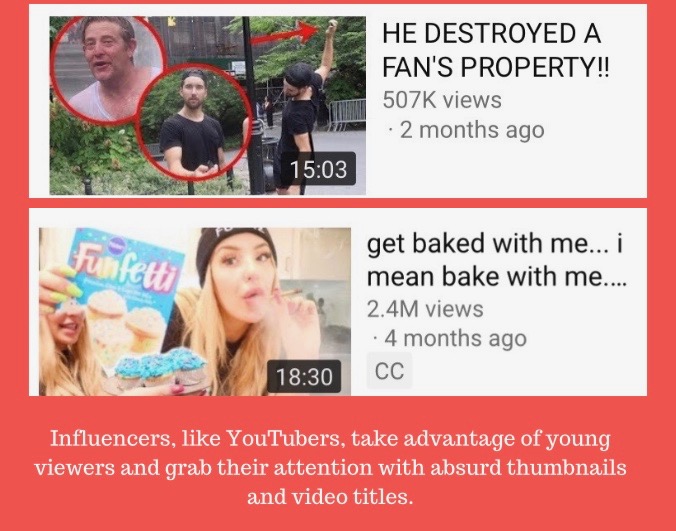YouTubers abuse their platform for personal gain
A graphic that portrays examples of poor behavior found in the videos of YouTubers like Jason Nash and Tana Mongeau.
October 7, 2019
From the many scandals caused by YouTube beauty gurus to the vulgar vlogs of David Dobrik, popular influencers across YouTube capitalize too often on susceptible children.
YouTube influencers generally make money through partnerships with brands and advertisers that fork out money to plaster their product or service on an influencer’s platform.
According to learn.g2.com, offers are based on their past success and reliability. The amount of viewers and their consistency determines reliability.
These business transactions that take place are innocent and occur in even the most accepted settings. This concept presents itself in huge events like the Super Bowl. Businesses pay unthinkable amounts of money to get their commercials aired during it, and no one bats an eye.
However, the way in which some of these influencers exploit this method to earn their paycheck deserves questioning.
Take adored YouTube vlogger, David Dobrik, for example. His videos capture insane moments inside his group of friends made to “wow” his audience, where he shares clips of people drinking copious amounts of alcohol, doing dangerous stunts, and talking of wildly inappropriate topics. While Dobrik does not encourage his audience to partake in the same habits, he condones it by glamorizing it.
Despite the crazed antics of some of these influencers, businesses still see a wealth of opportunity. To keep up with this demand, influencers crank out crazier and even more entertaining content to keep the viewership and income steady.
This is where lines are crossed. As soon as viewers get bored with content pushed out by creators, the panic of losing viewership and money sets in. And with that comes even more immoral content.
To stick with David Dobrik as an example, as he gained more subscribers and views, his videos grew more and more outrageous. He went from doing simple bits with his roommates to filming reactions to the genitals of one of his friends, gambling thousands of dollars, and taping the drunken and trashy behavior of others. Both Dobrik and his friends even admit to doing these things solely “for the views.”
Poor influences have been around for quite some time. What differs here is accessibility. Viewers are only a few clicks away from being taken advantage of thanks to smartphones and Wi-Fi. Restrictions on what these influencers can post need more depth and magnitude to makeup for accessibility. Content that portrays behavior listed above should be limited, if not rid of altogether.
And what do the young and impressionable viewers take away from this content? That careless decisions only lead to minor consequences? That is not real life. Productive members of society do the exact opposite of some of these influencers through honest living and some kids just do not grasp that.
If they continue to abuse their platforms for personal gain, because they are allowed to do so, the content will eventually have a more significant effect on the behavior of young viewers and their perception of acceptable behavior.


